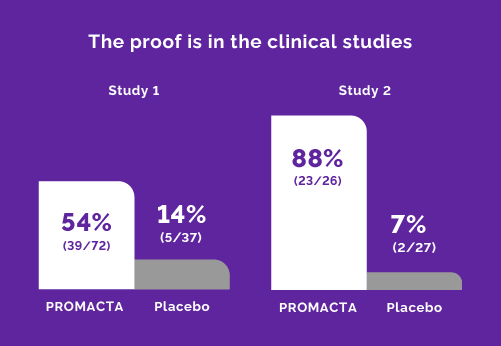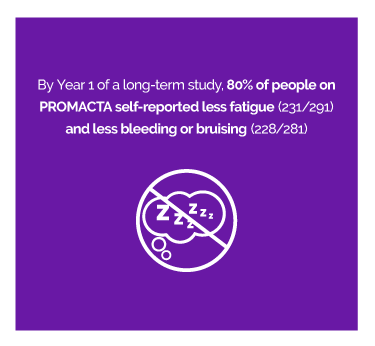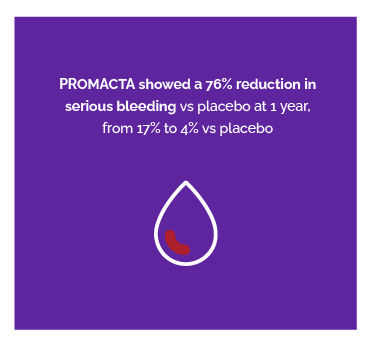You're not alone. See resources to learn about and help manage your persistent or chronic ITP
How PROMACTA May Help
Start getting unstuck from ITP today
Start getting unstuck from ITP today
Watch how PROMACTA can help you take back control of ITP
*PROMACTA has been proven to work for children over the age of 1 year with persistent or chronic ITP.
†Source: IQVIA prescription claims data for August 2020 through January 2022. Includes people with chronic immune thrombocytopenia, severe aplastic anemia, and chronic hepatitis C virus.
Have other treatments, such as steroids or intravenous immunoglobulin (IVIg), not worked to keep your platelet levels stable or have they caused too many side effects?
PROMACTA® (eltrombopag) may be an option to treat your persistent or chronic immune thrombocytopenia (ITP) that is due to low platelets. Once-daily PROMACTA may quickly boost your platelet counts and keep them stable over time. It is not used to make your platelet counts normal.
PROMACTA has been studied extensively in more people with persistent or chronic ITP than any other drug of its kind, including 3 clinical trials for adults and 1 long-term study that lasted 7 years. More than 700 adults were enrolled in the 3 separate studies and 302 of them went on to participate in the long-term study, which was the longest and largest ever run in persistent or chronic ITP.
Did you know PROMACTA is also proven to work for children with persistent or chronic ITP as young as 1 year old? Go here to learn more.
PROMACTA is proven to boost platelet counts
PROMACTA worked fast
In 2 separate trials, the majority of patients achieved their target platelet goal (≥50,000/mcL) in as early as 2 weeks.

The primary end point of both studies was response rate at Day 43. In Study 1: 59% (43/73) receiving PROMACTA vs 16% (6/37) for placebo; in Study 2: 70% (19/27) receiving PROMACTA vs 11% (3/27) for placebo.
In a clinical trial of 302 adults, PROMACTA demonstrated the longest results ever reported in persistent or chronic ITP.
PROMACTA may also help with fatigue, bleeding, and bruising due to reduced platelet counts


A wide range of patients were included in these clinical studies
|
Data from 3 clinical studies and 1 long-term study of PROMACTA |
|
|
% of Males |
31%-39% |
|
% of Females |
61%-69% |
|
Median Age |
47-50 years old |
|
Average Starting |
Less than 30,000/mcL |
Did you know? ITP affects women more than men, at a rate of almost 2:1.
PROMACTA has been extensively studied in ~900 people with persistent or chronic ITP (ages 1 to 85)
- 730 adults
- 159 children
In clinical trials, consistently proven across patient types, regardless of age, sex, race, starting platelet count, number of medications taken for ITP, and whether or not their spleen had been removed
PROMACTA has demonstrated consistent safety, study after study
No other treatment for persistent or chronic ITP has been studied more than PROMACTA:
- The safety of PROMACTA was established in ~900 people, ranging in age from 1 to 85
- No single side effect occurred in more than 10% of people across 4 clinical studies
- PROMACTA may cause serious side effects, including liver problems, blood clots, and cataracts
- The most common side effects of PROMACTA in adults and children include:
- low red blood cell count (anemia)
- nausea
- fever
- abnormal liver function tests
- cough
- tiredness
- headache
- diarrhea
- See additional safety information in the full Prescribing Information
- At 6 years of treatment, no new side effects were seen in comparison with the short-term trials
Now that you know PROMACTA has been proven to work for a wide range of people in clinical trials, find out how it works in your body to help boost platelets. Click here.
What to expect when you’re starting PROMACTA
While everyone is unique, you may find it helpful to learn about other people's experiences.
Watch PROMACTA Real Stories to hear from other patients with ITP.
Learn more about:



